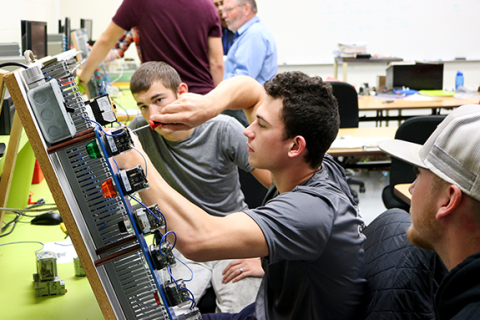Care Team
Practicing proactive prevention to support a positive environment.
contact
Contact
CARE TEAM MEMBERS
Carin Benning
Coordinator of Professional & Technical Pathways Advising
937.778.7808
Lee Harmon
Director of Public Safety & Chief of Police
937.778.7986
Dr. Paul Heintz
Dean of Arts & Sciences
937.778.7921
Caryn Scott
Associate Professor of Social Sciences
937.778.7927
Commitment to safety.
The Communication, Awareness, Response & Evaluation (CARE) Team is cross-functional and utilizes behavioral threat assessment model protocols to determine the risk levels of observable behaviors and actions. This team serves as the College's Behavioral Threat Assessment Management Team, assisting in proactively preventing targeted violence using data-driven tools provided by the Ohio School Safety Center, Ohio Department of Public Safety, and the U.S. Secret Service National Threat Assessment Center.
NOTE Scroll to the bottom of this page to complete the Care Team Referral Form.
mission
The mission of the CARE Team is to enhance the physical and emotional safety of students, faculty, staff, and others to support the teaching-learning environment.
The goal.
The CARE Team supports these efforts by:
- Providing designated referral points to where behaviors of concern can be referred.
- Collecting input from multiple sources, providing more comprehensive data for analysis.
- Assessing potential disruption, threats, and violence utilizing a specific, objective process for evaluation and intervention.
- Minimizing or eliminating disruption to the teaching-learning process and community and college operations through early intervention and support.
Fulfilling our mission and meeting our goals requires the engagement and active participation of all members of the College community. You are vital to our success and critical to ensuring a safe and vibrant learning environment.
Learn more about the Care Team.
The Communication, Awareness, Response & Evaluation (CARE) Team utilizes a protocol to appropriately address critical student behavior, mental health issues, or incidents. Team members receive the report through campus email when a referral is submitted through the CARE online form. The CARE team convenes immediately for reports requiring immediate intervention to assess the situation and develop an appropriate response. Otherwise, the team evaluates non-emergency reports during weekly meetings to develop the appropriate response to each person of concern. In some situations, the CARE team will communicate regarding steps to gain additional information to assess specific situations better.
Once a referral is made, and depending on the situation, immediate action may be taken:
- The CARE team will meet and discuss the incident.
- Additional information from the reporter and other people may be collected.
- The NaBITA Threat Assessment Tool is utilized.
- Appropriate intervention is determined, and action/additional action is taken.
- Feedback is provided (when appropriate and in keeping with federal and state laws).
The CARE team needs everyone in the Edison State family to feel empowered to make referrals. You are the eyes and ears of Edison State daily. Our team cannot be everywhere at once, and your contribution is vital if we are to be a proactive, effective CARE team that enhances the physical and emotional safety of our College community.
How do I make a referral to the CARE Team?
- Via the CARE Team Referral Form that can be found below.
- By phone to any member of the CARE team
- Personal contact with any team member
- Campus email
What behaviors should I refer to the CARE Team?
- Erratic behavior (including online activities) that disrupts the mission and/or normal proceedings of students, faculty or staff.
- Violation of personal space.
- Implication or direct threat of harm to themselves or others.
- The display of what is perceived as a weapon.
- Physical or verbal confrontation and/or attack.
- Stalking or harassment of a faculty member or student.
- Delusional thinking, hallucinations, or psychotic behavior.
- Threatening, aggressive, or hostile verbalizations or correspondence (email, letters, voicemail, etc.).
- Clearly noticeable changes in behavior, demeanor, dress, or personality from what was noted previously as typical for that individual.
- Any behavior of concern that doesn't fit into the categories above.
What information should I include in the referral?
If using the web form, just let the fields guide you. Otherwise, to the extent possible, please try to provide the following information based on the five W's:
- Who was involved? Multiple persons? Witnesses?
- What happened? Details of observation?
- When did the event occur? Date/Time?
- Where did the event take place?
- Why did the event occur?
What happens after I make a referral to the CARE Team?
- Depending upon the situation, immediate action may be taken.
- The CARE team will meet and discuss the incident.
- Additional information from the reporter and other people may be collected.
- The NaBITA Threat Assessment Tool is utilized.
- Appropriate intervention is determined, and action/additional action is taken.
- Feedback is provided.
Will I receive feedback after making a referral to the CARE Team?
Depending on the situation, confidentiality, FERPA, and other legal considerations, the reporter will receive select information.
Need to make a referral? Complete the form below and our CARE Team will contact you.








